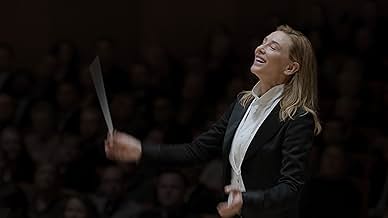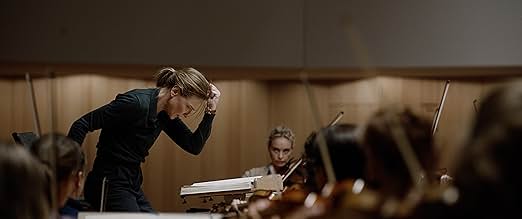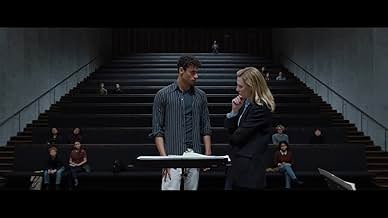Situado no mundo internacional da música clássica ocidental, o filme é centrado em Lydia Tár, amplamente considerada uma das maiores compositoras-regentes vivas e a primeira diretora musical... Ler tudoSituado no mundo internacional da música clássica ocidental, o filme é centrado em Lydia Tár, amplamente considerada uma das maiores compositoras-regentes vivas e a primeira diretora musical de uma grande orquestra alemã.Situado no mundo internacional da música clássica ocidental, o filme é centrado em Lydia Tár, amplamente considerada uma das maiores compositoras-regentes vivas e a primeira diretora musical de uma grande orquestra alemã.
- Direção
- Roteirista
- Artistas
- Indicado a 6 Oscars
- 79 vitórias e 271 indicações no total
Zethphan D. Smith-Gneist
- Max
- (as Zethphan Smith-Gneist)
Alec Baldwin
- Alec Baldwin
- (narração)
Avaliações em destaque
How much you enjoy Tar will depend largely on how you feel about a film that begins with the credits. There's good reason for it (everything in Tar is considered down to the smallest detail) but if you can't get on board with that kind of self indulgence then you are in for a long two and a half hours.
One of the reasons for beginning with the credits may be that we are about witness a career in reverse. An opening interview lets us know that Lydia Tar is at the top of her profession, a conductor with a dream resume and an EGOT who is about to complete her masterpiece symphony recording. Over the next couple of hours we see her slipping down the mountain as past deeds and the way she treats people in general come back to take a bite out of her perfect life.
The film solely follows Kate Blanchett's Tar for the entire runtime, we see all events from her perspective and she is in every scene. Blanchett put its an astounding performance, indeed it is hard to imagine many, if any, other actors who could have been up to the task. That the whole show rests on such a powerful but subtle turn is Tar's greatest strength but also its only real weakness. Its a nuanced performance that fits perfectly but added to the characters flawed nature it can at times leave proceedings feeling cold and hard to connect with emotionally. Like its titular character Tar is a film of craftmanship and intellect not emotion, although the themes of hierarchy dynamics and abuse are powerful.
If you can get on board with the full force filmaking style then you will find Tar a breathtaking wonder of a movie with something to think about in every scene and something to ponder long after the (second lot of) credits roll.
9 successful recordings out of 10 symphonies.
One of the reasons for beginning with the credits may be that we are about witness a career in reverse. An opening interview lets us know that Lydia Tar is at the top of her profession, a conductor with a dream resume and an EGOT who is about to complete her masterpiece symphony recording. Over the next couple of hours we see her slipping down the mountain as past deeds and the way she treats people in general come back to take a bite out of her perfect life.
The film solely follows Kate Blanchett's Tar for the entire runtime, we see all events from her perspective and she is in every scene. Blanchett put its an astounding performance, indeed it is hard to imagine many, if any, other actors who could have been up to the task. That the whole show rests on such a powerful but subtle turn is Tar's greatest strength but also its only real weakness. Its a nuanced performance that fits perfectly but added to the characters flawed nature it can at times leave proceedings feeling cold and hard to connect with emotionally. Like its titular character Tar is a film of craftmanship and intellect not emotion, although the themes of hierarchy dynamics and abuse are powerful.
If you can get on board with the full force filmaking style then you will find Tar a breathtaking wonder of a movie with something to think about in every scene and something to ponder long after the (second lot of) credits roll.
9 successful recordings out of 10 symphonies.
Don't be fooled by the great reviews, if you're someone who's not particularly interested in orchestras, conductors and random old musicians from times past, this movie is an utter bore. The first 10 minutes are CREDITS. JUST CREDITS. Then it drags on with the most absolutely annoying, long, mind-numbing scenes where rich, white people just talk to each other about the most esoteric stuff, with cameos of the actress talking to her orchestra about which string needs to be pulled in which direction.
I'm dead serious, 1 and a half hour later, you still can't tell what the hell's going on. It's just scenes of her talking about the most mundane stuff, and playing instruments.
It's a pretentious movie, that appears completely different and way more interesting in the trailer, but in reality is just an elitist blob of nothingness aesthetic. If you value your money and time, don't watch this movie.
I'm dead serious, 1 and a half hour later, you still can't tell what the hell's going on. It's just scenes of her talking about the most mundane stuff, and playing instruments.
It's a pretentious movie, that appears completely different and way more interesting in the trailer, but in reality is just an elitist blob of nothingness aesthetic. If you value your money and time, don't watch this movie.
For every era of cinematic history, there are the films that decades later people look at them as the ones that showed a period in time for how it was. Tar will be remembered as one of the movies that defined the early 2020s. It's a complex character study that refuses to take a side, one that shows a deeply complicated person for who she is. This is a downfall story (you can see why Scorsese called it his favorite movie of the year), in which highly successful composer/conductor Lydia Tar falls from grace after allegations (that may or may not be true) emerge that she had a sexual relationship with a student, Krista Taylor, that ended in her suicide. It's an intensely psychological film, with a thin line between what is literally and not literally happening.
An intense character study by definition needs to be driven by a strong performance, and Cate Blanchett delivers not only the best performance of her career, but also the best performance of the year. Every part of her masterful performance is believable. At times she does not seem like a movie character as much as a real person whose life is being broadcast. She is equal parts powerful yet vulnerable, imposing yet fragile, villain yet victim. Blanchett humanizes Lydia Tar and all of her faults in a way that very few completely fictional movie characters are.
Tar is a film driven by well-handled juxtapositions. The primary example (as well as the most successful) is the aforementioned aspects of Lydia Tar's character. The setting of present day Berlin adds to the juxtaposition. It's one of Europe's premier cultural cities, but yet the aesthetic of the film turns it into a claustrophobic, lifeless prison. Even the concert hall of the Berlin Philharmonic, one of the most important venues in classical music, feels limiting. And then, of course, there's the ending. All I'll say is that it took us gamers by surprise.
It is perhaps unexpected for a movie that takes aim at cancel culture to gain traction in the way that Tar did. At a time when people fall in line with hiveminds and nuance is nonexistent, Tar is a movie that shows the deep complications of the human condition, where no one is all good, and no one is all bad. This is a distinctly contemporary aspect that adds a new layer to the classic downfall story, a character arc that has been told for millennia. The corrupting nature of power never changes; Citizen Kane is as relevant now as it was in 1941. The message here is clear: power corrupts not only the individual, but the masses as well.
One of the best things about Tar is the power of what is not shown. Krista Taylor's face does not appear on screen even once. Her voice is never heard either. She is the downfall of Lydia Tar and one of the most important characters in the movie and is completely invisible, and it works perfectly well. This aids the unbiased look at Lydia, by blocking any possibility of our own biases being affected by Krista as a character. Mahler's music is the perfect choice for this movie, as he was one of the great composers of the Romantic era, and is very emotionally driven, especially that 5th Symphony.
In a few decades, people will still be talking about Tar. People will associate Tar with the 2020s the same way they associate Taxi Driver with 1970s urban America, or even Caligari to the Weimar Republic. It will be a window into today's world for future generations. It's a great film back by a fantastic performance that handles its subject matter very well. This is the best film of 2022.
An intense character study by definition needs to be driven by a strong performance, and Cate Blanchett delivers not only the best performance of her career, but also the best performance of the year. Every part of her masterful performance is believable. At times she does not seem like a movie character as much as a real person whose life is being broadcast. She is equal parts powerful yet vulnerable, imposing yet fragile, villain yet victim. Blanchett humanizes Lydia Tar and all of her faults in a way that very few completely fictional movie characters are.
Tar is a film driven by well-handled juxtapositions. The primary example (as well as the most successful) is the aforementioned aspects of Lydia Tar's character. The setting of present day Berlin adds to the juxtaposition. It's one of Europe's premier cultural cities, but yet the aesthetic of the film turns it into a claustrophobic, lifeless prison. Even the concert hall of the Berlin Philharmonic, one of the most important venues in classical music, feels limiting. And then, of course, there's the ending. All I'll say is that it took us gamers by surprise.
It is perhaps unexpected for a movie that takes aim at cancel culture to gain traction in the way that Tar did. At a time when people fall in line with hiveminds and nuance is nonexistent, Tar is a movie that shows the deep complications of the human condition, where no one is all good, and no one is all bad. This is a distinctly contemporary aspect that adds a new layer to the classic downfall story, a character arc that has been told for millennia. The corrupting nature of power never changes; Citizen Kane is as relevant now as it was in 1941. The message here is clear: power corrupts not only the individual, but the masses as well.
One of the best things about Tar is the power of what is not shown. Krista Taylor's face does not appear on screen even once. Her voice is never heard either. She is the downfall of Lydia Tar and one of the most important characters in the movie and is completely invisible, and it works perfectly well. This aids the unbiased look at Lydia, by blocking any possibility of our own biases being affected by Krista as a character. Mahler's music is the perfect choice for this movie, as he was one of the great composers of the Romantic era, and is very emotionally driven, especially that 5th Symphony.
In a few decades, people will still be talking about Tar. People will associate Tar with the 2020s the same way they associate Taxi Driver with 1970s urban America, or even Caligari to the Weimar Republic. It will be a window into today's world for future generations. It's a great film back by a fantastic performance that handles its subject matter very well. This is the best film of 2022.
It is not surprising that this film is tanking at the box office since it is much too long and slow paced for the average movie goer's attention span. Indeed parts of it, like the agonizingly protracted opening scene where a New Yorker magazine music critic interviews the title character about her classical music esthetics, seem designed by writer/director Tod Field as a boredom experiment wherein if you can survive it without running and screaming into the night out of sheer and utter ennui then you are worthy to see the rest of his "masterpiece".
Thing is, though, that a lot of this film does approach, if not encroach upon, masterpiece territory. Certain scenes, like Lydia Tar's bleak Staten Island homecoming where she summons the spirit of her mentor Leonard Bernstein in an effort to recapture the humanistic values she has lost, are genuinely heartbreaking. And the sequences that deal with Lydia's manipulation of her acolytes are difficult to watch as we see how artistic power feels even more corruptible, somehow, than the political kind, perhaps because it is a profanation of a purer space.
And I think we can all agree that Cate Blanchett is one helluva fine actor! As are Nina Hoss, Noemie Merlant and Sophie Kauer who play various of her entourage/victims.
Bottom line: For all its faults I have a sneaking suspicion that in twenty years they'll be watching this and not "The Fabelmans". Give it a B plus.
Thing is, though, that a lot of this film does approach, if not encroach upon, masterpiece territory. Certain scenes, like Lydia Tar's bleak Staten Island homecoming where she summons the spirit of her mentor Leonard Bernstein in an effort to recapture the humanistic values she has lost, are genuinely heartbreaking. And the sequences that deal with Lydia's manipulation of her acolytes are difficult to watch as we see how artistic power feels even more corruptible, somehow, than the political kind, perhaps because it is a profanation of a purer space.
And I think we can all agree that Cate Blanchett is one helluva fine actor! As are Nina Hoss, Noemie Merlant and Sophie Kauer who play various of her entourage/victims.
Bottom line: For all its faults I have a sneaking suspicion that in twenty years they'll be watching this and not "The Fabelmans". Give it a B plus.
During the first minute of this film, Cate Blanchett shows what an extraordinary actress she is. Her character, star conductor Lydia Tár, is waiting to go onstage. There is no dialogue, only body language. But even without words, Blanchett shows what Tár thinks and feels.
Blanchett's remarkable performance is a large part of what makes this a good movie. But there's more. The very clever script gives us a lot to chew on afterards. Tár is a woman in the men-dominated world of classical music. She's not warm, empathic or even very sympathetic. In fact, she has many characteristics that are usually associated with men. She's vain, selfish and manipulative. And that's what gets her in trouble. At the start of the film, she seems to be one of the most admired women in the world. She is extremely famous and successful. At the end, everything has fallen apart.
The film doesn't judge. It leaves it up to the viewer to decide if Lydia Tár is a victim or a culprit. Or maybe both at the same time. The viewer gets a lot of information to make up his (or her) mind. Director Todd Field gives us the story elements slowly, bit by bit. Take the scene where Lydia Tár gives a stern speech to a young girl who bullies her daughter. It shows that she is used to getting everyone in line, according to her wishes. That's useful information to interpret things later on in the movie.
Tár is very much a modern movie. It has things to say about gender, about power, about social media, about being woke. But at the same time, it's a very old-fashioned movie. It takes its time. There are long scenes, and long takes. There's nothing modern in the way it is filmed. And that's a good thing.
Blanchett's remarkable performance is a large part of what makes this a good movie. But there's more. The very clever script gives us a lot to chew on afterards. Tár is a woman in the men-dominated world of classical music. She's not warm, empathic or even very sympathetic. In fact, she has many characteristics that are usually associated with men. She's vain, selfish and manipulative. And that's what gets her in trouble. At the start of the film, she seems to be one of the most admired women in the world. She is extremely famous and successful. At the end, everything has fallen apart.
The film doesn't judge. It leaves it up to the viewer to decide if Lydia Tár is a victim or a culprit. Or maybe both at the same time. The viewer gets a lot of information to make up his (or her) mind. Director Todd Field gives us the story elements slowly, bit by bit. Take the scene where Lydia Tár gives a stern speech to a young girl who bullies her daughter. It shows that she is used to getting everyone in line, according to her wishes. That's useful information to interpret things later on in the movie.
Tár is very much a modern movie. It has things to say about gender, about power, about social media, about being woke. But at the same time, it's a very old-fashioned movie. It takes its time. There are long scenes, and long takes. There's nothing modern in the way it is filmed. And that's a good thing.
Você sabia?
- CuriosidadesProfessional cellist Sophie Kauer had no prior acting experience and auditioned at the encouragement of a friend. She learned to act by watching YouTube tutorials hosted by Michael Caine.
- Erros de gravaçãoWhen Lydia is talking to the two technicians after a rehearsal in Berlin, she requests they send her audio and video recordings, but the console in front of them in the booth is actually for controlling lights, not audio/video.
- Cenas durante ou pós-créditosThe opening credits presents the film crew and acknowledgments (usually shown at the end titles) without presenting the actors. The actors and soundtrack are shown at the ending without the crew.
- ConexõesEdited from A Bruxa de Blair (1999)
- Trilhas sonorasDas Wohltemperierte Klavier: Präludium and Fuge C-Dur, BWV 846
Written by Johann Sebastian Bach
Piano, Cate Blanchett
Principais escolhas
Faça login para avaliar e ver a lista de recomendações personalizadas
- How long is Tár?Fornecido pela Alexa
Detalhes
- Data de lançamento
- País de origem
- Centrais de atendimento oficiais
- Idiomas
- Também conhecido como
- Tar
- Locações de filme
- Dresden, Saxônia, Alemanha(Kulturpalast & Großen Garten Platz)
- Empresas de produção
- Consulte mais créditos da empresa na IMDbPro
Bilheteria
- Orçamento
- US$ 25.000.000 (estimativa)
- Faturamento bruto nos EUA e Canadá
- US$ 6.773.650
- Fim de semana de estreia nos EUA e Canadá
- US$ 158.620
- 9 de out. de 2022
- Faturamento bruto mundial
- US$ 29.177.163
- Tempo de duração2 horas 38 minutos
- Cor
- Mixagem de som
- Proporção
- 2.39 : 1
Contribua para esta página
Sugerir uma alteração ou adicionar conteúdo ausente



































